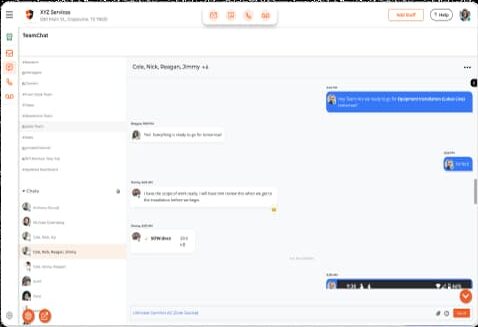As a contractor, you know how to solve problems.
Rewiring an old house? No problem. Renovating an outdated kitchen? Easy-peasy. Launching an integrated marketing campaign? Well, that might be a new one.
But, like any other project, once you know how to do it, it becomes another skill in your toolbelt.
In this post, we’ll explain how to market yourself as a contractor or freelancer. We’ve gathered tips from business management expert Carl Gould, who recently shared his experience working in the trades industry. We’ll describe how to improve your marketing skills, and provide a list of tools and services you can use to grow your business.

In the Trades: The
Ultimate Marketing
Guide
Tactics and checklists to help your home services business stand out in the crowd.
How to Market Yourself as a Contractor
When you’re working as a contractor, you might not have time to sit down and organize a multi-month marketing campaign – and that’s okay. Here are some things Gould says you can do right now to improve your marketing skills.
1. Respond to customers quickly.
Don’t leave your customers hanging – respond as soon as possible to maintain consistent communication. This not only improves your relationships, but also helps close deals, complete payments, and keep people satisfied with your service.
This is where SMS and messaging services like Facebook Messenger come in handy. They provide instant communication channels, and they’re relatively cheap to use. In fact, Gould notes that most providers offer services that cost anywhere between $0.015 and $0.05 per message.
Pro Tip: Consider using a shared inbox or communication center to consolidate messages in one place. These tools connect communication channels, so messages coming in from different channels are all stored in one place. This helps you manage high volumes of calls and emails, and makes it easier to respond faster.
2. Start and finish on time.
One way to build a positive reputation as a local contractor is to start and finish projects on time. This demonstrates that you’re reliable and can manage multiple projects simultaneously. After all, nothing’s more frustrating to customers than a project that never gets done.
Pro Tip: Scheduling software streamlines bookings and makes it easy to see which projects are on your schedule. You also don’t have to spend as much time setting up phone calls or meetings, since these tools automatically update your calendar – and people can see when you’re available before they schedule a call.
3. Be transparent and consistent with your pricing.
If you quote a project at one price, then slowly increase it to a higher one, that’s a quick way to upset your clientele.
Gould has a great quote that we’ll borrow from his webinar:
“People will spend their money to save time.” – Carl Gould
Be upfront with your pricing and be transparent and fair if things change. Keep in mind that an existing customer is 60-70% more likely to buy from you, so charging less now might end up profiting you more in the future.
Pro Tip: Consider using a free invoice generator to streamline payments and ensure accurate pricing.
4. Have a project manager onsite.
If your staff consists of you and you alone, you will have to be at every work site you manage.
But, as you grow and take on more clientele, you’ll eventually need to hire to keep up with demand. While you should recruit qualified and trusted talent, they shouldn’t replace your role in communication. If a customer strikes a deal with you, they expect to work with you and see you on the site. At the very least, you should be available to chat as needed for each project.
Pro Tip: A customer relationship management (CRM) system can help you manage and store information about the people you’ve worked with. This tool makes it easy to contact customers and shows your past interactions with them. (More about this later.)
5. Offer a free service.
Free services can build rapport with customers almost immediately. They get to see what it’s like to work with you and what to expect going forward.
You don’t have to offer much to get your customers’ attention. Gould gave a great example of how his company would offer to hang a shelf for free at a home or business. This helped him close deals with prospects, because they could see he offered a fair and trustworthy service.
Other ideas might include:
- Free Estimates
- Quick Cleanings (e.g., snaking a drain or lint removal)
- Service Reports
6. Research your competitors.
If you want to brainstorm marketing plays, look at what competitors in your area are doing. Pull up their websites, social media pages, and local listings to get a feel for how they’re communicating with customers. Pay close attention to what’s working and where you can stand out.
Another great place to look is at customer reviews. Google competing businesses and filter the results by most or least stars. Take note of any positive or negative patterns in what customers are saying. These are the pain points that your business will solve in its marketing communication.
7. Give customers multiple ways to contact you.
There are several reasons why you should have multiple points of contact for your business. First, it helps with local SEO and making your business more discoverable online. If you have a website, Google Business Profile, and social media pages, search engines will link to your business in their search results.
Another reason is convenience – for you and the customer. If you have an email address and a phone number, the customer can choose their preferred communication channel.
Pro Tip: The more points of contact that you offer, the more work it will take to manage each one. This is where a centralized inbox can organize communications and reduce the workload for you and your team.
8. Use customer communication tools.
There are plenty of free communication tools available to your business. Here are three that we recommend.
- CRM System: A CRM is like an online contact book. It stores information on each customer and allows you to keep track of their conversations, phone calls, text messages, and other interactions with your company.
- Team Chat: Team chat is an internal communication tool that team members use to stay in contact with each other. If you pair it with a CRM, you can quickly update your coworkers on your interactions with customers.
- Shared Inbox: A shared inbox gives everyone on your team access to all incoming messages from your clientele. If you’re not around to answer an email or phone call, someone on your team can step in and respond.
9. Offer a membership, subscription, or club.
Gould also emphasizes the importance of offering a membership or club at your business. He calls it the “number one strategy of commercial business in the last 500 years.”
Subscriptions and memberships keep customers coming back to your company because they have an incentive to work with you.
Another option is to bundle services together. Rather than doing one job at a time, you can offer a deal to do multiple projects at once. This commits you to a long-term contract with the customer that should remain profitable over time.
10. Maintain an excellent reputation.
Your reputation can make or break your business. Nowadays, most listing websites display customer reviews right next to your company whenever someone searches for your business.
But, here’s the thing – people are specifically looking for negative reviews. One study found that 96% of customers look for negative reviews before doing business with you. That means just one bad review could be enough to lose a potential customer.
Pro Tip: Consider skilling up in online reputation management. You should be comfortable with responding to negative reviews and keeping an eye on local listings.

In the Trades: The
Ultimate Marketing
Guide
Tactics and checklists to help your home services business stand out in the crowd.
Contractor Marketing Services
We know life gets busy as a contractor, and adding marketing campaigns might be another headache you’re not looking for. That’s why we’ve put together this list of tools, agencies, and services that can help you manage marketing communications.
Contractor Gorilla – Website-Building
If you don’t have a website for your business, Contractor Gorilla can build one from scratch. It has built over 3,000 websites for contractors and businesses in the trades industry. It also provides logo services, so you can completely overhaul the branding for your business.
What we like: Great for businesses trying to grow their online presence
Thryv – Communication Command Center

In addition to its marketing tools, Thryv offers a customer communication platform that’s ideal for small businesses. Its Command Center provides a shared inbox, team chat, and video call features that can streamline communication in one place. And, the basic version of these tools is provided for free (for up to five users), so you can test them out to see how they work before upgrading to any premium features or subscriptions.
What we like: A do-it-all solution that’s designed for small businesses
Blue Corona – SEO Marketing
Blue Corona is a marketing agency that completely owns the digital marketing efforts for your business. It will optimize your website for SEO, oversee your pay-per-click ads, and help run your email marketing. If you have the budget and are really looking to invest in your marketing channels, this might be the right solution for your business.
What we like: Great for growing businesses with a marketing budget
Guerilla Contractor Marketing – Website Optimization
This marketing agency focuses most of its efforts on website optimization, producing content for your business and helping you rank higher on search engines. It also offers web design and digital advertising services that can further expand your business’s reach.
What we like: Full-service content creation
Contractor Advertising – Social Media & Email
This agency is similar to the last one, but it also offers social media and email services. Its team will produce a competitor analysis of your industry and then determine which channels and content will perform best for your business. The agency can also help with paid social media campaigns, which can be a highly effective way to grow your following.
What we like: Organic and paid social media expertise
Contractor Charlie – Blog Content
Contractor Charlie provides a step-by-step walkthrough of how it will help your business. First, it optimizes your website, then manages SEO, and, finally, produces blog content for your business. This agency effectively becomes your content engine, producing new posts that can help you get discovered by search engines.
What we like: Continuous content production and optimization
Building Your Business With Contractor Marketing
Marketing doesn’t have to be an all-out campaign. In fact, some of the best marketing strategies are just about paying attention to details and making customer-centric decisions. Imagine the customer’s point-of-view, and think about the experience you would want to have. Then, do everything you can to bring that vision to life.




